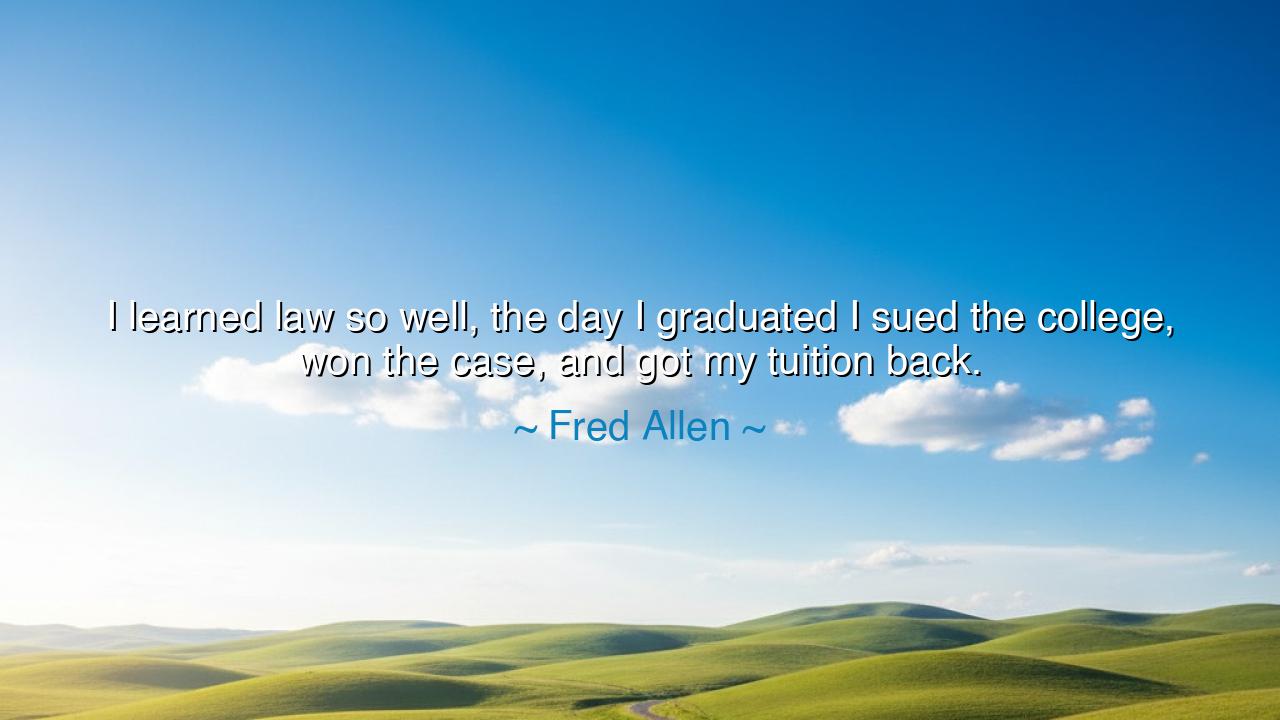
I learned law so well, the day I graduated I sued the college
I learned law so well, the day I graduated I sued the college, won the case, and got my tuition back.






Hearken, children of wit and wisdom, and heed the words of Fred Allen, who declared with audacious humor and cunning: "I learned law so well, the day I graduated I sued the college, won the case, and got my tuition back." In this quip lies a profound truth cloaked in jest—the power of knowledge, the mastery of skill, and the courage to wield them boldly. Allen’s words remind us that education is not merely an adornment for ceremony or pride, but a tool of empowerment, to be applied with insight, creativity, and ethical discernment.
The origin of this saying is rooted in Allen’s own experience as a student and observer of human institutions. While the humor is sharp, the lesson beneath is sharper: true learning equips the mind to act decisively, to identify injustices, and to seek redress where the unprepared might falter. Law, in this instance, is not abstract; it is living, breathing, and actionable. The classroom transforms from a place of instruction into a forge of skill, tempering intellect into a weapon of justice.
To grasp the depth of Allen’s jest, consider the boldness required to confront one’s own alma mater in court. It recalls the courage of historical figures like Cicero, who, trained in rhetoric and law, stood before the Senate to challenge corruption and defend the innocent. Knowledge, when mastered, is not passive; it commands the authority to act, to seek fairness, and to navigate the labyrinth of rules and precedent with clarity and confidence. Allen’s story, though humorous, illuminates this eternal principle: mastery demands application.
The humor in Allen’s quip belies its wisdom. By suing the college and winning his tuition back, he demonstrates the principle that education yields tangible power when coupled with audacity and strategy. Learning is not a trophy to be displayed but a force to shape circumstances, a light that exposes opportunity where others see only barriers. History is filled with such examples: Abraham Lincoln, self-taught in law, used his knowledge to shape policy, challenge injustice, and alter the course of a nation.
Yet, Allen’s lesson is not merely about cunning or opportunism—it is about responsibility and initiative. Knowledge must be applied with discernment, not wastefully or maliciously. The law he mastered was a vehicle for rightful claim, a demonstration of intellect meeting circumstance. It is the union of preparation and bold action that transforms potential into achievement. In every scroll of learning, there lies a call to wield skill with purpose and effect.
The broader teaching resonates far beyond the courtroom. Whether in commerce, politics, science, or art, mastery without application is a dormant seed; it is through action, courage, and ingenuity that knowledge becomes transformative. Allen’s tale reminds us that education is a living power, to be tested, exercised, and refined in the field of life, not merely admired in the halls of academia.
From this emerges a practical lesson: cultivate expertise in your chosen field, pursue understanding deeply, and seek opportunities to apply what you learn with boldness and discernment. Challenge assumptions, act with integrity, and do not shy from asserting knowledge when circumstances demand it. Knowledge, once earned, is not inert—it is a force to shape the world and secure justice.
Practical actions follow naturally: study your craft rigorously; seek mastery that allows confident action; identify moments where your knowledge can be applied to right wrongs or improve situations; and cultivate the courage to act decisively when opportunity aligns with preparation. In this, Allen’s story—both witty and instructive—teaches that learning, audacity, and application are inseparable, and that true education equips the mind not merely to think, but to act with wisdom and effectiveness.
If you wish, I can craft an even more epic, oratorical version, turning Allen’s quip into a mythic tale of wit, justice, and the heroic power of knowledge—perfect for immersive audio storytelling. Do you want me to do that?






AAdministratorAdministrator
Welcome, honored guests. Please leave a comment, we will respond soon